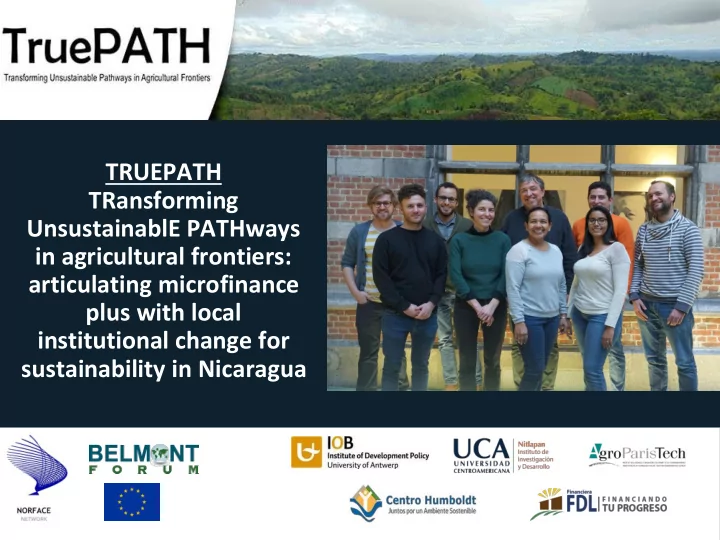

TRUEPATH TRansforming UnsustainablE PATHways in agricultural frontiers: articulating microfinance plus with local institutional change for sustainability in Nicaragua
Research context – Study territory
Objective Through an action-research study in Nicaragua, we want to • Co-generate actionable knowledge for the transformation of unsustainable cattle- based development pathways in agricultural frontiers • Explore possible contributions of ‘ Green Microfinance Plus’ . 3
Contributing to transformation in territorial pathways • Development Pathway approach • Political and complex process • Broader socio-economic, political and cultural transformation needed to address concerns of social exclusion and environmental degradation. • Enabling bottom-up actor-coalitions and ‘opening up’ policy space and different views on problems and solutions
The politics of transformation • Pluralization of epistemologies and sustainabilities • How local actors (including us as Nitlapan and FDL) perceive the local dynamics and its consequences? • How we all position ourselves within this dynamics? • To what extent alternative visions are there in the territory? • Politicization of transformation: • How does the relationship with FDL-Nitlapan constrain and enable us? • How transformative is this entry point?
Where we are in the work plan WP1: Characterization of WP2: Assessment of the the current and alternative role of finance in current development pathways in development pathways the study region • iterative gathering of local • Historical analysis of FDL actors on historical portfolio emergence and territorial dynamics WP4: Co)generation of WP3: Citizen science climate actionable knowledge for data generation for local transformation to sustainable production strategies development pathways • Inception of collective • Installation of weather stations and related reflection processes analysis of weather patterns and links with productive practices.
Challenges • Two subsequent crises have impacted the feasibility and logical planning of activities. • Socio-Political crisis April 2018 • Covid-19 pandemic March 2020 • Permanent need to re-articulate the logic of the project. • Parallel process of research and actions • Discussions with different actors at different levels • Tensions between; • The impact claims of the project vs the complexity, long term, non-centrality of research within the real world T2S processes • deliberative/facilitating role and deliberate (political) intervention based on values/ideas about T2S
Recommend
More recommend